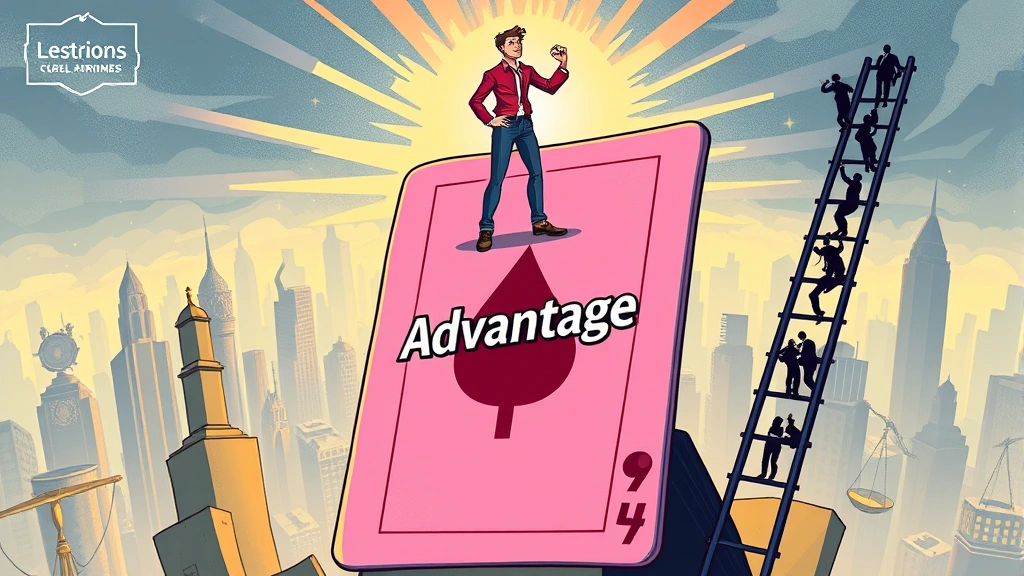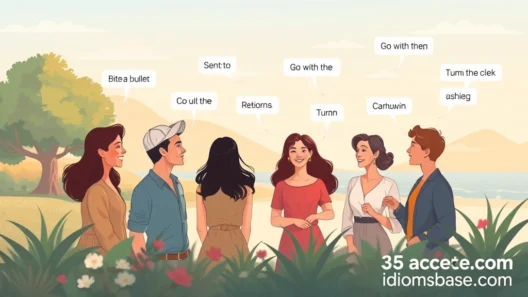Have you ever wanted to express how someone has an edge, a leg up, or a clear superiority in a situation? English is rich with colorful idioms that perfectly capture the essence of "advantage." These phrases aren't just fancy words; they're shortcuts to understanding, adding depth and nuance to your conversations and writing.
Idioms are a fantastic way to sound more like a native speaker and truly grasp the intricacies of the English language. They often paint vivid pictures in your mind, making communication more engaging and memorable. So, if you're ready to boost your vocabulary and express the concept of "advantage" like a pro, you've come to the right place!
35 Idioms for Advantage
Let's dive into some of the most useful and common idioms that describe having an advantage. Each one offers a slightly different shade of meaning, giving you plenty of options to choose from!
Idioms About Having an Edge or Superiority
-
Have the upper hand: To be in a position of control or advantage over someone else.
- Example: "After the new evidence was presented, the prosecution clearly had the upper hand."
-
Have an edge: To have a slight advantage over someone or something else.
- Example: "Her experience in the field gave her an edge over the other candidates."
-
Get a leg up: To receive help or an advantage that puts one in a better position.
- Example: "Networking with industry leaders can help you get a leg up in your career."
-
Hold all the cards: To be in a strong position because you have all the power or information.
- Example: "In the negotiation, the buyer held all the cards as the seller was desperate to sell."
-
Have the whip hand: To be in a position of power or control over someone.
- Example: "With the budget approved, the project manager now has the whip hand."
-
Be one step ahead: To anticipate something before it happens, giving you an advantage.
- Example: "She's always one step ahead, planning her moves carefully."
-
Have an ace up your sleeve: To have a secret advantage or plan that you can use when needed.
- Example: "Don't worry, I still have an ace up my sleeve for this negotiation."
-
Get the jump on someone: To gain an advantage by starting before someone else or by acting quickly.
- Example: "We need to get the jump on our competitors by launching our product sooner."

-
Have the inside track: To have special access or information that gives you an advantage.
- Example: "He has the inside track for the promotion because his uncle works here."
-
Be in the driver's seat: To be in control of a situation.
- Example: "Once we secure the funding, we'll be in the driver's seat for this project."
-
Have the ball in your court: It's your turn to make a move or decision, giving you the immediate advantage.
- Example: "I've made my offer; now the ball is in your court."
-
Be sitting pretty: To be in a very good or advantageous financial or social position.
- Example: "After his successful IPO, he's sitting pretty for life."
-
Have a head start: To begin before others, giving you an initial advantage.
- Example: "Studying over the summer gave her a head start on the new school year."
-
Gain ground: To make progress and get closer to an equal or advantageous position.
- Example: "Our new marketing strategy is helping us gain ground on our rivals."
-
Have the wind in your sails: To have favorable conditions or circumstances that aid your progress.
- Example: "With the economy booming, our business has the wind in its sails."
Idioms About Creating or Using an Advantage
-
Leverage something: To use something to maximum advantage.
- Example: "We need to leverage our brand recognition to enter new markets."
-
Play your cards right: To act skillfully or cleverly to achieve an advantage.
- Example: "If you play your cards right, you could get a significant raise."

-
Turn the tables: To reverse a situation so that you now have the advantage.
- Example: "After being behind, they managed to turn the tables in the second half of the game."
-
Strike while the iron is hot: To act decisively and take advantage of an opportunity when it arises.
- Example: "The market is ripe for this product; we need to strike while the iron is hot."
-
Capitalize on something: To take advantage of a situation to gain benefit.
- Example: "We need to capitalize on this positive publicity."
-
Make hay while the sun shines: To make good use of an opportunity while it lasts.
- Example: "The tourists are here, so we must make hay while the sun shines."
-
Seize the day (Carpe Diem): To take advantage of the present moment without concern for the future.
- Example: "Don't postpone your dreams; seize the day!"
-
Take advantage of: To make good use of an opportunity.
- Example: "You should take advantage of the free training offered by the company."
-
Get a foot in the door: To gain an initial opportunity or position that could lead to greater things.
- Example: "Even an internship can help you get a foot in the door at a top company."
-
Have the upper hand: To be in a position of control or advantage. (Yes, it's so useful it deserves a second mention for emphasis on its application!)
Idioms About Having an Unfair or Hidden Advantage
- Have an unfair advantage: To have a benefit that others do not, often implying impropriety.
- Example: "His family connections gave him an unfair advantage in the hiring process."

-
Stack the deck: To arrange things unfairly to one's own advantage.
- Example: "The rules were changed to stack the deck in favor of the incumbent."
-
Cook the books: To dishonestly manipulate financial records to gain an advantage.
- Example: "The CEO was accused of cooking the books to inflate profits."
-
Pull strings: To use influence with powerful people to gain an advantage.
- Example: "She had to pull some strings to get her child into that exclusive school."
-
Have an inside track: To have special knowledge or access that gives an advantage. (Another one that's incredibly versatile!)
Idioms Describing the Outcome of Advantage
-
Be in the lead: To be ahead of others in a competition or race.
- Example: "Our team is currently in the lead by ten points."
-
Win the day: To emerge victorious or successfully achieve one's goal.
- Example: "Despite the challenges, persistence helped them win the day."
-
Come out on top: To be successful or victorious in a competition or difficult situation.
- Example: "After all the struggles, he still managed to come out on top."
-
Have it made: To be in a very comfortable and successful position, often for life.
- Example: "With that inheritance, she's got it made."
-
Have the world at your feet: To be extremely successful and admired, with many opportunities.
- Example: "After winning the championship, the young athlete had the world at her feet."
Frequently Asked Questions
What is an idiom?
An idiom is a phrase or expression where the meaning cannot be understood from the ordinary meaning of its individual words. It's a figurative saying that has a commonly understood meaning within a language. English is full of them, making it a fun, yet sometimes tricky, language to learn!
Why are idioms important to learn?
Learning idioms helps you understand native speakers better and makes your own English sound more natural and fluent. They add color and expressiveness to your language, allowing you to convey complex ideas in a concise and memorable way. Plus, they often reveal cultural insights!
How can I remember so many idioms?
Practice, practice, practice! Here are a few tips:
- Contextualize: Try to use new idioms in sentences or conversations.
- Group them: Learn idioms by theme, like "idioms for advantage."
- Visual aids: Draw pictures or find images that represent the idiom's meaning.
- Flashcards: Create flashcards with the idiom on one side and its meaning/example on the other.
- Read and listen: Pay attention to how native speakers use idioms in books, movies, and daily conversations.
Can I use these idioms in formal writing?
It depends on the idiom and the context. Some idioms, like "have the upper hand" or "gain ground," are widely accepted in both formal and informal settings. Others, like "cook the books" or "pull strings," might be too informal or carry negative connotations for formal writing. Always consider your audience and the tone of your writing. When in doubt, opt for more direct language in very formal documents.
Are there any idioms that mean the opposite of "advantage"?
Absolutely! Here are a few:
- Be at a disadvantage: To be in an unfavorable position.
- Be a step behind: To be slower or less prepared than others.
- Have two strikes against you: To be in a very unfavorable position, often with limited chances left.
- Be up against the wall: To be in a difficult situation with few options.
Key Takeaways
Wow, you've just unlocked a treasure trove of expressions! Here’s what we’ve learned:
- Idioms are essential for fluency: They make your English sound natural and sophisticated, helping you communicate more effectively.
- "Advantage" has many shades: From a slight edge to complete control, there's an idiom for every nuance of superiority.
- Context is king: The best way to learn and remember idioms is to see them in action and try using them yourself.
- Practice makes perfect: Don't be afraid to experiment with these new phrases. The more you use them, the more comfortable you'll become!
So, go forth and express your advantages with confidence! You've got the tools now to really stand out. Which of these idioms will you try using first? Let us know!






